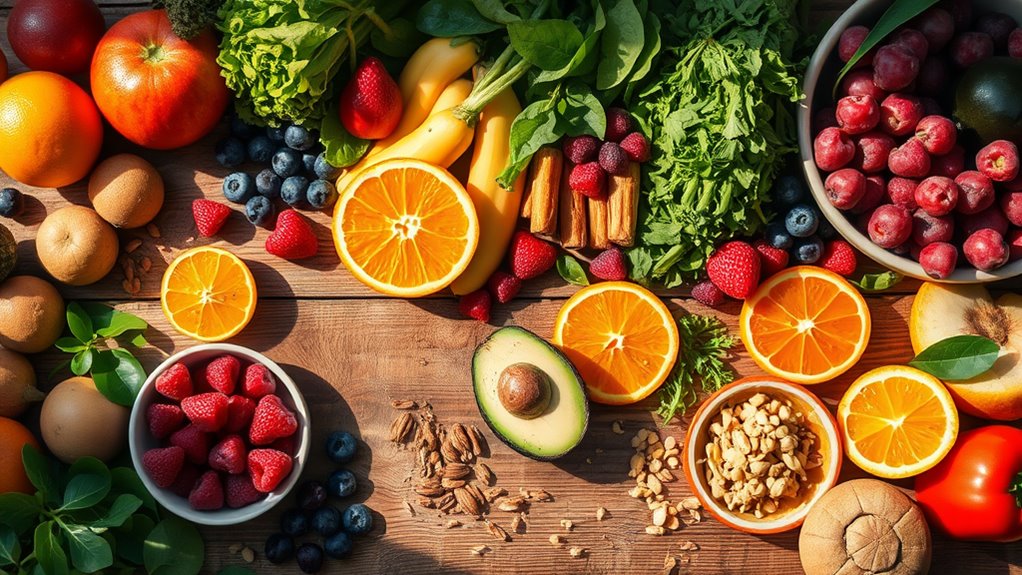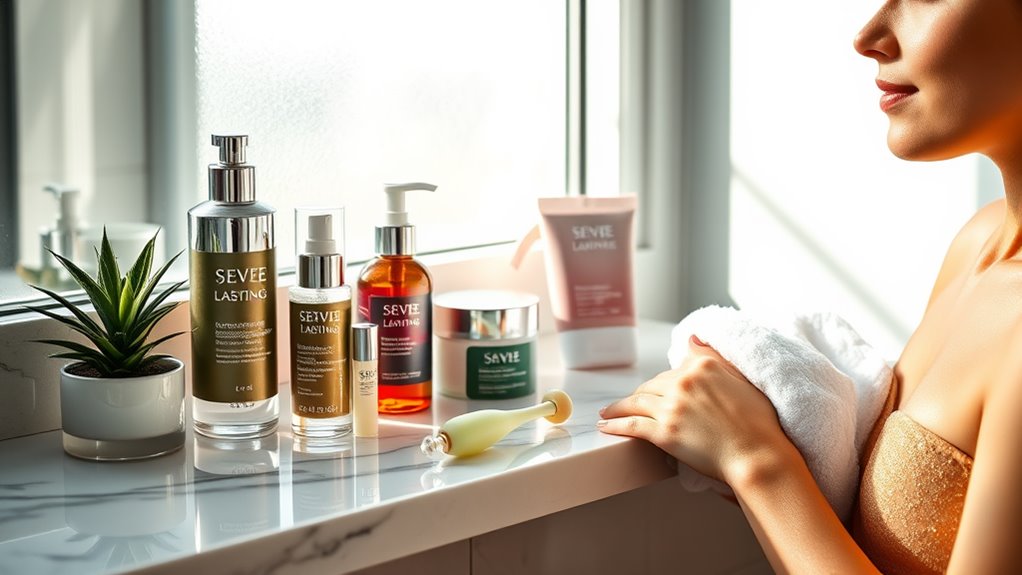What to Eat (And Avoid) If You Want Perfect Skin
To achieve perfect skin, focus on nutrient-dense foods rich in antioxidants, such as berries and leafy greens. Incorporate healthy fats from avocados and nuts, and make sure to stay hydrated with water-rich fruits and vegetables. Avoid sugars and processed foods that can trigger inflammation and breakouts. Dairy might worsen some skin conditions, so watch your intake. Lastly, consider the effects of alcohol and caffeine on hydration. There’s more valuable information to explore on maintaining skin health.
Key Takeaways
- Eat antioxidant-rich foods like berries and leafy greens to protect your skin from damage and promote collagen production.
- Include omega-3 fatty acids from sources like fatty fish and walnuts to maintain skin elasticity and hydration.
- Stay hydrated by consuming water-rich fruits and vegetables, such as cucumbers and watermelon, to enhance skin vitality.
- Avoid refined sugars and processed foods to reduce inflammation and prevent breakouts that affect skin clarity.
- Monitor dairy consumption, as low-fat dairy may trigger breakouts and inflammation in some individuals.
The Importance of Nutrition for Skin Health
When it comes to achieving radiant skin, what you eat plays a crucial role. You should focus on incorporating nutrient-dense foods for perfect skin into your diet.
Omega-3 fatty acids, found in fatty fish and walnuts, help maintain skin’s elasticity and hydration. Additionally, healthy fats from avocados nourish your skin from the inside out.
Don’t overlook the importance of vitamins; Vitamin C, abundant in citrus fruits and bell peppers, aids collagen production, essential for skin structure. Whole grains and legumes provide antioxidants and anti-inflammatory properties, promoting an even complexion. Furthermore, avoiding common foods that trigger acne can also significantly improve your skin health.
Foods Rich in Antioxidants
When it comes to achieving perfect skin, incorporating foods rich in antioxidants is essential. Berries, like blueberries and strawberries, are packed with vitamins and compounds that fight free radicals, promoting a youthful glow. Additionally, leafy greens such as spinach and kale provide vital nutrients that help maintain skin elasticity and overall health. Furthermore, antioxidants play a crucial role in protecting the skin from environmental damage and reducing signs of aging.
Berries for Skin Health
Berries are a powerhouse of nutrients that can significantly enhance your skin’s health. Packed with antioxidants like vitamin C and anthocyanins, they help combat oxidative stress, which can lead to premature aging.
Consuming berries regularly can improve your skin’s texture and tone, as these antioxidants protect cells from damage and support collagen production. Blueberries, strawberries, and raspberries are particularly effective; they boost hydration and may even reduce inflammation and acne.
For optimal results, incorporate a variety of berries into your diet—whether in smoothies, salads, or as snacks. By making berries a staple in your nutrition plan, you’ll nourish your skin from the inside out, giving you a radiant, youthful glow.
Leafy Greens Benefits
Incorporating leafy greens into your diet can significantly boost your skin’s health, thanks to their rich antioxidant content. Greens like spinach, kale, and Swiss chard are packed with vitamins A, C, and E, which help protect your skin from oxidative stress and promote collagen production.
This, in turn, enhances skin elasticity and reduces the appearance of fine lines. Additionally, the high fiber content in leafy greens aids digestion, ensuring your body efficiently eliminates toxins that can affect your skin’s clarity.
Aim to include a variety of these greens in salads, smoothies, or stir-fries. By consistently consuming leafy greens, you’ll not only nourish your skin but also support overall health, leading to a radiant complexion.
Hydrating Foods for Glowing Skin
To achieve that coveted glow, focusing on hydrating foods can make a significant difference in your skin’s appearance. Incorporating water-rich fruits and vegetables, like cucumbers, watermelon, and oranges, helps maintain skin moisture and elasticity. These foods not only hydrate but also deliver essential vitamins and antioxidants that combat free radicals, promoting a youthful look.
Additionally, don’t overlook the power of soups and broths; they’re excellent for hydration and can be packed with nutrients if you include vegetables. Herbal teas can also contribute to your hydration goals while offering anti-inflammatory benefits.
Essential Fatty Acids and Their Benefits
While hydrating foods play a vital role in maintaining skin health, essential fatty acids (EFAs) provide another layer of support for achieving that radiant complexion.
These fats, particularly omega-3 and omega-6, are crucial for maintaining your skin’s barrier function, keeping it hydrated and plump. They help reduce inflammation, which can lead to redness and acne flare-ups, promoting an even skin tone.
Incorporating sources like fatty fish, flaxseeds, and walnuts into your diet can significantly enhance your skin’s resilience and elasticity. Additionally, EFAs assist in cell production, ensuring your skin remains youthful and vibrant.
Prioritize these nutrients for optimal skin health, and you’ll likely notice a marked improvement in your complexion over time.
Vitamins and Minerals That Promote Skin Vitality
When it comes to achieving vibrant, healthy skin, the right vitamins and minerals can make all the difference.
Vitamin C is essential for collagen production, helping to maintain skin elasticity and firmness. Incorporate citrus fruits, strawberries, and bell peppers to boost your intake.
Vitamin E acts as a potent antioxidant, protecting your skin from oxidative stress; nuts and seeds are excellent sources.
Zinc is crucial for skin healing and inflammation reduction, so include legumes, whole grains, and meat in your diet.
Don’t forget about vitamin A, which promotes skin cell turnover; you can find it in carrots, sweet potatoes, and leafy greens. Additionally, incorporating nutrient-rich foods into your meals can enhance your skin’s overall health and appearance.
The Role of Probiotics in Skin Care
Your gut health plays a crucial role in the appearance of your skin, often referred to as the gut-skin connection.
Incorporating probiotics into your diet can help balance your gut microbiome, potentially leading to clearer, healthier skin.
Foods like yogurt, kefir, and fermented vegetables are excellent sources of these beneficial bacteria.
Gut-Skin Connection
The gut-skin connection reveals how the health of your digestive system can significantly impact your skin’s appearance and overall condition.
When your gut microbiome thrives, it helps regulate inflammation and supports the skin’s barrier function. This balance can reduce issues like acne, eczema, and rosacea.
In contrast, an imbalanced gut—often marked by poor diet or antibiotic use—can lead to increased inflammation and skin problems. Research shows that probiotics can enhance gut health, leading to clearer, healthier skin.
By incorporating probiotics into your routine, you’re not only supporting your digestive health but also fostering a vibrant complexion.
Probiotic Sources for Skin
How can probiotics play a pivotal role in achieving radiant skin? Probiotics support your gut health, which directly impacts your skin’s appearance.
By balancing your microbiome, they can help reduce inflammation and acne while promoting hydration.
Here are four excellent sources of probiotics to consider:
- Yogurt: Look for live cultures in unsweetened varieties for maximum benefits.
- Kefir: A fermented milk drink packed with diverse probiotic strains.
- Sauerkraut: This fermented cabbage dish is rich in beneficial bacteria and antioxidants.
- Kimchi: A spicy fermented vegetable dish that also provides vitamins and minerals.
Incorporating these foods into your diet can enhance your skin’s health, giving you that glowing complexion you desire.
Sugars and Processed Foods to Avoid
While indulging in sugary treats and processed foods might seem tempting, these choices can significantly impact your skin’s health. High sugar intake leads to increased insulin levels, which triggers inflammation and may exacerbate acne. Processed foods, often rich in unhealthy fats and additives, can disrupt your gut microbiome, further affecting skin clarity. Refined carbohydrates, like white bread and pastries, can cause blood sugar spikes, promoting collagen breakdown and accelerating aging. Additionally, research suggests that certain foods can lead to an increase in acne flare-ups, highlighting the importance of dietary choices. Instead, focus on whole foods—opt for fruits, vegetables, and whole grains that provide essential nutrients and antioxidants. By eliminating or reducing sugars and processed foods, you’re making a powerful choice for your skin’s vitality, enhancing its glow and resilience.
Dairy Products: Friend or Foe?
Eliminating sugars and processed foods from your diet can pave the way for healthier skin, but what about dairy products?
The impact of dairy on your skin can vary. Here are four key points to consider:
-
Hormones: Some dairy, especially low-fat options, can contain hormones that may trigger breakouts.
-
Inflammation: Dairy can contribute to inflammation in some individuals, exacerbating skin conditions like acne and eczema.
-
Nutrients: On the flip side, dairy is rich in calcium and vitamin D, which are essential for skin health.
-
Individual Response: Everyone’s body reacts differently; keep a food diary to track how dairy affects your skin.
The Impact of Alcohol and Caffeine on Skin
Alcohol can significantly dehydrate your skin, leaving it looking dull and more prone to fine lines.
Caffeine, while offering a temporary boost, can also impact your hydration levels if consumed in excess.
Alcohol Dehydrates Your Skin
When you indulge in alcoholic beverages, you’re not just enjoying a night out; you’re also putting your skin at risk of dehydration.
Alcohol acts as a diuretic, leading to increased urination and reduced moisture levels in your skin. This can result in a dull complexion, fine lines, and a loss of elasticity.
To mitigate the effects of alcohol on your skin, consider these practical tips:
- Stay Hydrated: Drink water before, during, and after consuming alcohol.
- Limit Intake: Try to moderate your alcohol consumption to reduce dehydration.
- Choose Wisely: Opt for lighter drinks like wine or cocktails with a high water content.
- Nourish Your Skin: Use hydrating serums and moisturizers to replenish moisture.
Prioritize your skin’s health for a radiant appearance!
Caffeine’s Impact on Hydration
While many people rely on caffeine to boost their energy, it’s important to recognize how it can affect your skin’s hydration levels. Caffeine is a diuretic, meaning it can lead to increased urine production, which can ultimately deplete your body’s hydration.
When you’re dehydrated, your skin may appear dull, dry, and less elastic. Studies show that excessive caffeine consumption can interfere with skin barrier function, making it harder for your skin to retain moisture.
To maintain optimal hydration, consider balancing your caffeine intake with adequate water consumption. Incorporating hydrating foods, like fruits and vegetables, can also help counteract caffeine’s dehydrating effects.
Moderation Is Key
Although it’s tempting to indulge in that evening glass of wine or a morning coffee, moderation is crucial for maintaining healthy skin. Excessive alcohol and caffeine can lead to dehydration, inflammation, and a lackluster complexion.
To keep your skin glowing, consider these guidelines:
-
Limit alcohol intake: Aim for no more than one drink per day; this helps prevent dehydration and skin puffiness.
-
Opt for low-caffeine alternatives****: Choose herbal teas or decaf options to reduce caffeine’s dehydrating effects.
-
Stay hydrated: For every alcoholic beverage, drink a glass of water to counteract dehydration.
-
Monitor skin reactions: Pay attention to how your skin responds; if you notice breakouts or dullness, it may be time to cut back.
Tips for Maintaining a Balanced Diet for Skin Health
To achieve radiant skin, it’s essential to focus on a balanced diet rich in nutrients that support skin health. Incorporate a variety of fruits and vegetables, particularly those high in antioxidants like berries and leafy greens, which combat oxidative stress. Include healthy fats from sources like avocados and nuts, as they help maintain skin moisture. Stay hydrated by drinking plenty of water, aiming for at least eight glasses daily. Limit refined sugars and processed foods, which can trigger inflammation and breakouts. Additionally, don’t forget to consume lean proteins, like fish and legumes, that promote collagen production. Finally, consider moderating dairy intake, as some individuals may experience skin sensitivity. Master these dietary habits for optimal skin health. Including essential foods in your diet can significantly enhance your skin’s appearance and overall health.




